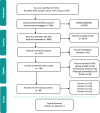Barriers, facilitators, perceptions and impact of interventions in implementing antimicrobial stewardship programs in hospitals of low-middle and middle countries: a scoping review
- PMID: 38263235
- PMCID: PMC10804809
- DOI: 10.1186/s13756-024-01369-6
Barriers, facilitators, perceptions and impact of interventions in implementing antimicrobial stewardship programs in hospitals of low-middle and middle countries: a scoping review
Abstract
Background: Antimicrobial stewardship programs (ASPs) are pivotal components of the World Health Organization's Global Action Plan to combat antimicrobial resistance (AMR). ASPs advocate rational antibiotic usage to enhance patient-centered outcomes. However, existing evidence on ASPs and their determinants is largely limited to well-equipped hospitals in high-income nations.
Objective: This scoping review aimed to examine the current state of hospital-based ASPs in low- and middle-income countries (LMICs), shedding light on barriers, facilitators, prescribers' perceptions and practices, and the impact of ASP interventions.
Design: Scoping review on ASP.
Methods: Adhering to PRISMA guidelines, we conducted electronic database searches on PubMed, Scopus, and Google Scholar, covering ASP articles published between January 2015 and October 2023. Our review focused on four key domains: barriers to ASP implementation, facilitators for establishing ASP, ASP perceptions and practices of prescribers, and the impact of ASP interventions. Three reviewers separately retrieved relevant data from the included citations using EndNote 21.0.
Results: Among the 7016 articles searched, 84 met the inclusion criteria, representing 34 LMICs. Notably, 58% (49/84) of these studies were published after 2020. Barriers to ASP implementation, including human-resources shortage, lack of microbiology laboratory support, absence of leadership, and limited governmental support, were reported by 26% (22/84) of the studies. Facilitators for hospital ASP implementation identified in five publications included the availability of antibiotic guidelines, ASP protocol, dedicated multidisciplinary ASP committee, and prompt laboratory support. The majority of the research (63%, 53/84) explored the impacts of ASP intervention on clinical, microbiological, and economic aspects. Key outcomes included increased antibiotic prescription appropriateness, reduced antimicrobial consumption, shorter hospital stays, decreased mortality rate, and reduced antibiotic therapy cost.
Conclusions: The published data underscores the imperative need for widespread antimicrobial stewardship in LMIC hospital settings. Substantial ASP success can be achieved through increasing human resources, context-specific interventions, the development of accessible antibiotic usage guidelines, and heightened awareness via training and education.
Keywords: Antimicrobial stewardship program (ASP); Low- and middle-income countries (LMIC); Scoping review.
© 2024. The Author(s).
Conflict of interest statement
The authors declare no competing interests.
Figures
Similar articles
-
Hospital-Based Antimicrobial Stewardship Programs Used in Low- and Middle-Income Countries: A Scoping Review.Microb Drug Resist. 2022 May;28(5):566-584. doi: 10.1089/mdr.2021.0363. Epub 2022 Mar 24. Microb Drug Resist. 2022. PMID: 35333607
-
Barriers to implementing antimicrobial stewardship programs in three low- and middle-income country tertiary care settings: findings from a multi-site qualitative study.Antimicrob Resist Infect Control. 2021 Mar 25;10(1):60. doi: 10.1186/s13756-021-00929-4. Antimicrob Resist Infect Control. 2021. PMID: 33766135 Free PMC article.
-
Beyond the black stump: rapid reviews of health research issues affecting regional, rural and remote Australia.Med J Aust. 2020 Dec;213 Suppl 11:S3-S32.e1. doi: 10.5694/mja2.50881. Med J Aust. 2020. PMID: 33314144
-
A systematic review of Antimicrobial Stewardship Program implementation in Middle Eastern countries.Int J Infect Dis. 2021 Apr;105:746-752. doi: 10.1016/j.ijid.2021.03.035. Epub 2021 Mar 15. Int J Infect Dis. 2021. PMID: 33737132
-
An Assessment of the Current Level of Implementation of the Core Elements of Antimicrobial Stewardship Programs in Public Hospitals in Ghana.Hosp Pharm. 2024 Jun;59(3):367-377. doi: 10.1177/00185787231224066. Epub 2024 Feb 15. Hosp Pharm. 2024. PMID: 38764988 Free PMC article.
Cited by
-
Reduce, reinforce, and replenish: safeguarding the early-life microbiota to reduce intergenerational health disparities.Front Public Health. 2024 Oct 23;12:1455503. doi: 10.3389/fpubh.2024.1455503. eCollection 2024. Front Public Health. 2024. PMID: 39507672 Free PMC article. Review.
-
Association of Knowledge and Attitude Toward Antibiotic Use and Resistance With Self-Medication Practice of Antibiotics Among Bangladeshi Private University Teachers: A Cross-Sectional Study.Health Sci Rep. 2025 Mar 3;8(3):e70526. doi: 10.1002/hsr2.70526. eCollection 2025 Mar. Health Sci Rep. 2025. PMID: 40041790 Free PMC article.
-
Increasing the use of the WHO AWaRe system in antibiotic surveillance and stewardship programmes in low- and middle-income countries.JAC Antimicrob Resist. 2025 Mar 19;7(2):dlaf031. doi: 10.1093/jacamr/dlaf031. eCollection 2025 Apr. JAC Antimicrob Resist. 2025. PMID: 40110554 Free PMC article. Review.
-
Evaluation of a Hub-and-Spoke Model to Enhance Healthcare Professionals' Practice of Antimicrobial Stewardship (AMS) Programmes in the Volta Region of Ghana.Antibiotics (Basel). 2025 Jul 2;14(7):672. doi: 10.3390/antibiotics14070672. Antibiotics (Basel). 2025. PMID: 40723975 Free PMC article.
-
The antibiotic procurement saga: a long-neglected stewardship target to combat antimicrobial resistance in Pakistan.Antimicrob Resist Infect Control. 2025 Feb 7;14(1):7. doi: 10.1186/s13756-025-01521-w. Antimicrob Resist Infect Control. 2025. PMID: 39920829 Free PMC article.
References
-
- Harun MGD, Anwar MMU, Sumon SA, Hassan MZ, Haque T, Mah EMS, Rahman A, Abdullah S, Islam MS, Styczynski AR, Kaydos-Daniels SC. Infection prevention and control in tertiary care hospitals of Bangladesh: results from WHO infection prevention and control assessment framework (IPCAF) Antimicrob Resist Infect Control. 2022;11(1):125. - PMC - PubMed
Publication types
MeSH terms
Substances
LinkOut - more resources
Full Text Sources
Miscellaneous


